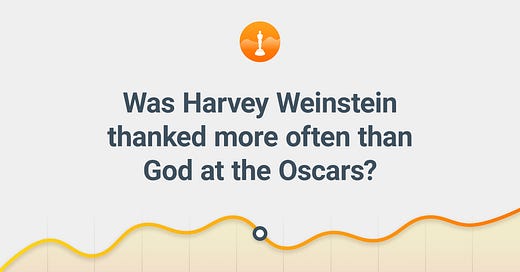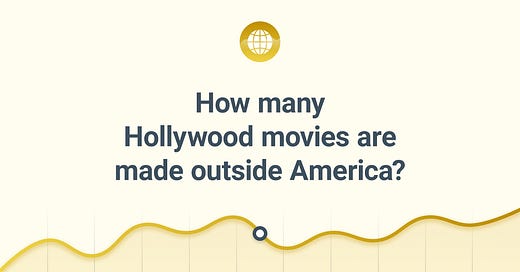
Should UK broadcasters show more UK films?
Last Friday, the UK's media regulator, Ofcom, instructed the BBC to increase the number of original UK television programmes it shows at peak-time. Ofcom pointed to the BBC's Royal Charter, which includes the duty for BBC output to be "distinctive, creative and [reflect] the UK’s diverse communities".
Based on new research, Ofcom said that original, UK-made programming is increasingly important to the UK population and so they have increased the BBC's obligations towards new, UK-made content.
The Ofcom statement focused on television programmes, but it raises the question: what obligations should public service broadcasters have towards UK-made movies?
So I thought I'd take a look at how British films fare on British public service broadcast networks and ask if Ofcom should extend their new rules to UK films.
Public service broadcasting in the UK
Public service broadcasting (PSB) is a hot topic in the UK. To some, it's an aspect of British life they are very proud of, up there with the NHS, while to others it's forced taxation and unfair competition for the private sector.
The most prominent public service broadcaster is the BBC, which is publicly owned and principally funded by the licence fee (currently £147 a year per household). However, the BBC is not alone. Channel 4 is publicly owned (although commercially funded via advertising) and the other private terrestrial networks (such as ITV and Channel 5) also have public service duties as a condition of their broadcast licence. It's Ofcom's role as media regulator to police how these channels live up to their PSB duties and to change the rules when public opinion shifts.
Via an annual survey, Ofcom asks 3,000 Brits about various aspects of UK public service broadcasting and how the networks are living up to their duties. It's the most recent version of this survey that led to last week's statement.
83% of the UK population believe it's important that public service broadcasters show UK-made programmes, up from just 67% six years ago.
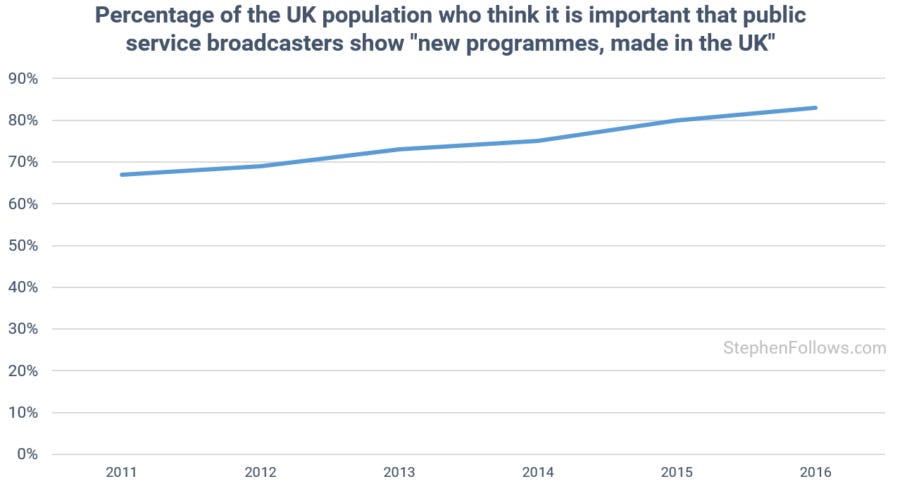
Films on UK television
Films have had an increasingly hard time on UK terrestrial channels over the past decade. In 2006, 17% of peak-time hours were devoted to movies, whereas by 2016 that had dropped to just 6%.
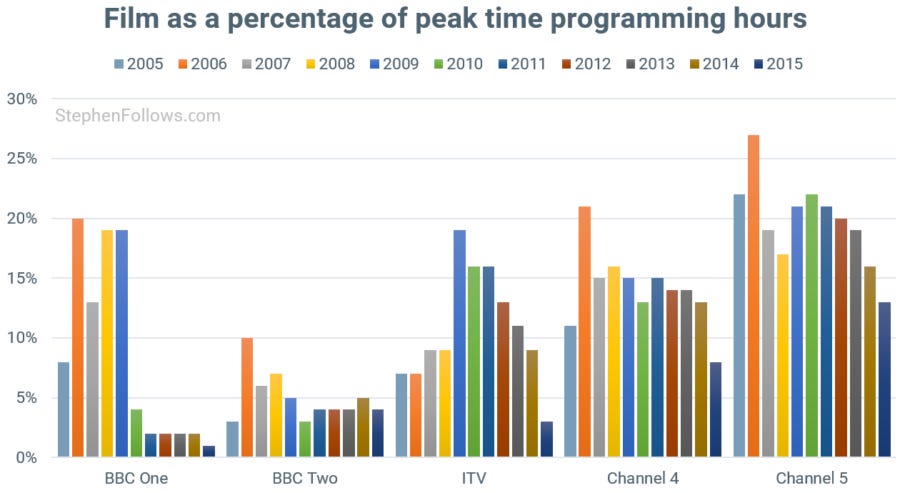
Not only that, but on most channels the vast majority of film screenings are repeats. In 2015, only 7% of films screened on BBC One were premieres, only 9% on BBC Two, 9% on Channel 5 and a dismal 4% on ITV. By contrast, Channel 4 appears much more committed to new movies, with new movies representing 26% of their film output.
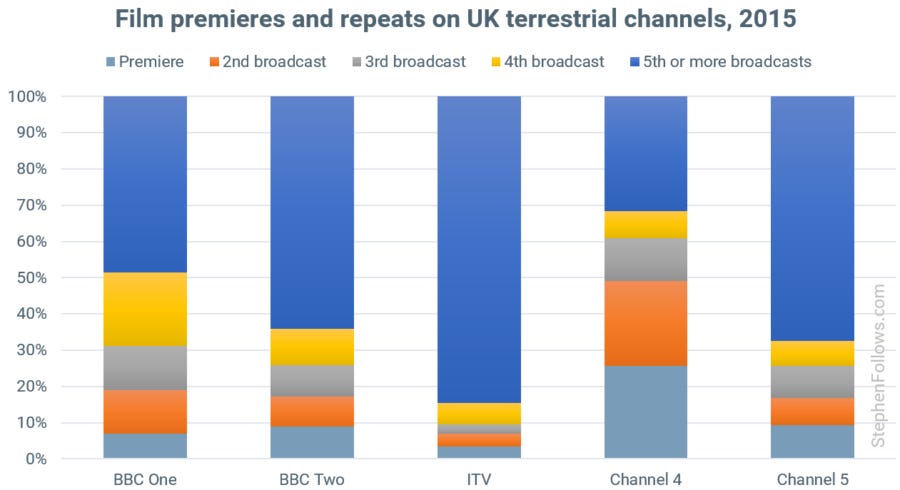
How many UK films are broadcast on UK terrestrial television?
The Ofcom missive to the BBC was around increasing their original, UK-made programming. So let's focus on UK films on UK public service broadcasters.
Throughout all of 2015, BBC One showed just 17 recent UK films ("recent" is defined as having been initially released in cinemas within the past eight years) out of a total of 227 films broadcast. This means that recent UK films accounted for just 7.5% of film broadcasts, or if we use the previous peak-time data as a guide, just 0.08% of all transmission hours.
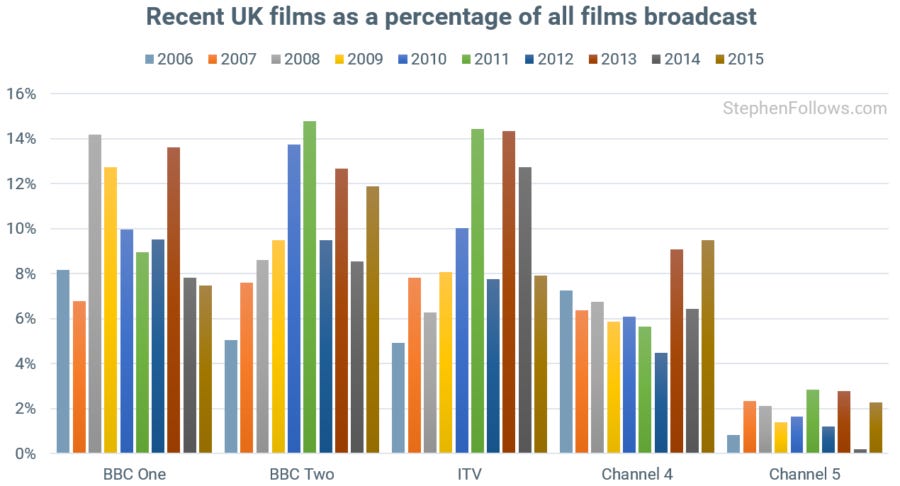
Why does this matter?
The screening of UK films on UK PSB networks is important for two reasons:
UK cultural identity
Films are a major component of a nation's culture. Indeed, culture can be defined as the stories we tell ourselves about ourselves, and so new British movies are part of our shared identity. Therefore, screening them on the UK's most-watched channels is of huge cultural importance.
Supporting the UK film industry
Not only is television the largest income stream for UK films, it's also the one with the highest profit margin. The cost of agreeing and delivering on a television deal is relatively small when compared with the huge costs of theatrical and home video distribution.
Plus, television deals are much less taxing on low-budget films. They may struggle in cinemas without huge advertising budgets but they can easily supply a master copy to a broadcaster.
So, if Ofcom were to apply the new tougher UK-content rules to the acquisition of UK-made feature films, it would be a big help to the UK film industry.
Notes
Data for today's article came from Ofcom, Attentional, BARB and the BFI. The BFI's wonderful annual Statistical Yearbook has more data about films on UK TV and you can access it at bfi.org.uk/education-research/film-industry-statistics-research/statistical-yearbook.
Last week's Ofcom statement focused on the BBC as (a) it's fee funding, so it is expected to go further than other public service broadcasters and (b) the BBC's operating licence is being renewed next year and so Ofcom has attached these new rules to that.
Epilogue: UK's relationship with Video On Demand (VOD)
One slightly-off-topic-but-interesting thing I spotted in Ofcom's research is data on the number of people in the UK who have ever used the internet to watch or download a programme or film.
Before you look at the answer, have a quick guess - what percentage of the UK population have ever streamed or downloaded a TV show or movie?
Here are six possible answers:
A quarter
A third
A half
Two thirds
Three quarters
All but one guy called Bernard.
Place your bets....
.
.
.
.
.
.
In 2011 the answer was 36% but by 2016 it has grown to 53%. Depending on your age, this may seem like a lot or very few. That's because your propensity to watch online content is heavily connected to age. Last year, 72% of 16 to 24-year-olds said that they had watched online content, whereas just 34% of those over 55 years old had.
Personally, I'm shocked to learn that 28% of 16 to 24-year-olds haven't watched an online show or movie.
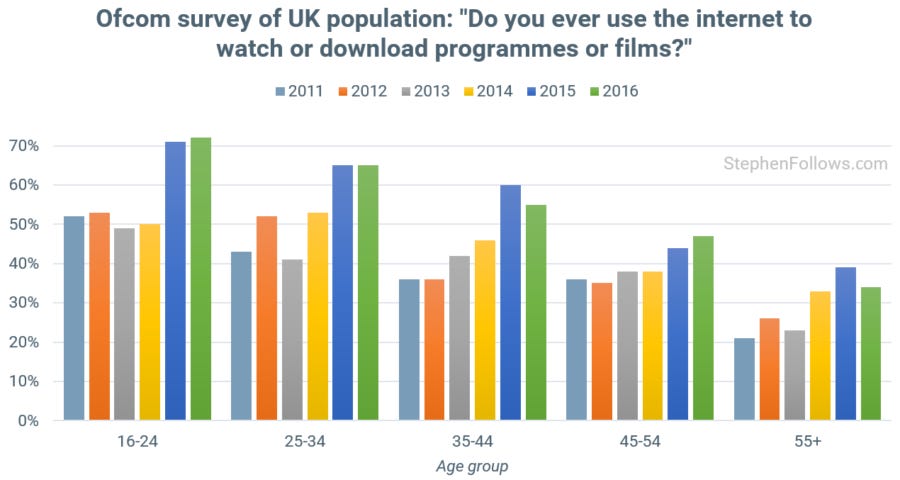
The film industry is hoping that the VOD sector will continue to grow, and will eventually replicate the heights of the DVD boom in the 2000s. When I conducted an industry-wide survey in 2014, I found that 61% of film professionals thought the VOD sector would match the peak of DVD "within four years". We're almost at that four-year mark but there's still a long way to go. UK VOD revenues totalled £1.3 billion in 2016, only two-thirds of 2004's DVD peak of £2 billion.
Ofcom's finding that only half the of the UK's population have ever streamed a film or TV show could give the industry comfort that there is still plenty space for the VOD market to grow.





